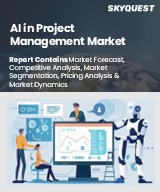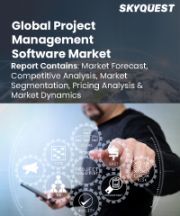
|
시장보고서
상품코드
1895737
프로젝트 관리용 AI 시장 규모, 점유율, 성장 분석 : 컴포넌트별, 전개 모드별, 조직 규모별, 용도별, 최종 이용 산업별, 지역별 - 업계 예측(2026-2033년)AI in Project Management Market Size, Share, and Growth Analysis, By Component (Solutions, Services), By Deployment Mode (Cloud, On-Premises), By Organization Size, By Application, By End-Use Industry, By Region - Industry Forecast 2026-2033 |
||||||
세계의 프로젝트 관리용 AI 시장 규모는 2024년에 29억 3,000만 달러로 평가되었고, 2025년 34억 4,000만 달러에서 2033년까지 123억 3,000만 달러로 성장할 전망이며, 예측 기간(2026년-2033년) CAGR은 17.3%를 보일 것으로 예측됩니다.
프로젝트 관리 분야에서 AI 기술의 도입은 빠르게 산업을 변화시키고 있으며, 조직이 데이터 기반 의사결정을 통해 효율성을 높이고 비용을 절감할 수 있도록 돕고 있습니다. 머신러닝, 자연어 처리, 컴퓨터 비전, 예측 분석의 고급 기능을 통해 워크플로우를 간소화하고, 위험을 예측하며, 일상적인 작업을 자동화하는 지능형 프로젝트 관리 도구를 개발했습니다. 이러한 AI 기반 솔루션은 팀이 전략적 이니셔티브에 우선순위를 두고 운영상의 복잡성을 효과적으로 처리할 수 있도록 지원합니다. AI 분석을 통해 프로젝트 관리자는 더 깊은 통찰력을 얻고, 리스크를 사전에 파악하며, 자원 배분을 최적화하고, 프로젝트 성과를 향상시킬 수 있습니다. 또한, 고급 컨텐츠 관리 시스템은 정보를 자동으로 분류하고 통합하여 협업을 촉진하고, 컨텐츠를 부담이 아닌 귀중한 자산으로 전환합니다. 전반적으로, 프로젝트 관리에서 AI 통합은 보다 스마트하고 적응력이 높은 업무 운영을 촉진합니다.
세계 프로젝트 관리의 AI 시장 성장 촉진요인
조직이 점점 더 복잡하고 대규모 프로젝트에 직면하면서 프로젝트 관리를 최적화하기 위해 AI 기반 예측 분석에 대한 의존도가 높아지고 있습니다. 이 기술을 통해 프로젝트 관리자는 과거 데이터와 실시간 데이터를 모두 활용하여 지연, 예산 초과, 자원 부족 등의 잠재적 문제를 예측할 수 있습니다. 머신러닝 알고리즘은 현재 진행 상황과 성과 지표를 평가하고 기한 초과 가능성을 예측합니다. 귀중한 통찰력을 제공함으로써 팀은 자원과 전략을 사전에 조정할 수 있으며, 궁극적으로 의사결정과 프로젝트 성과를 향상시킬 수 있습니다. 이러한 미래지향적 사고는 IT, 의료, 건설 등의 산업을 중심으로 다양한 분야에서 AI 기능에 대한 투자를 촉진하고 있습니다.
세계 프로젝트 관리의 AI 시장 억제
프로젝트 관리에서 AI의 잠재력은 크지만, 도입에는 종종 큰 재정적 장벽이 존재합니다. 이러한 장벽에는 AI 도구 구매 또는 구독 비용, 데이터 사이언스자 및 AI 엔지니어와 같은 유능한 인재 채용, 기존 직원 교육, 기존 시스템과의 원활한 통합 보장 등이 포함됩니다. 중소기업(SME)은 특히 AI의 이점이 즉각적으로 드러나지 않는 경우, 이러한 비용을 정당화하는 데 어려움을 겪을 수 있습니다. 이러한 재정적 장벽은 중소기업 부문 시장 확대를 제한하고, 궁극적으로 프로젝트 관리 분야에서 AI 도입의 전반적인 속도를 저해하고 있습니다.
세계 프로젝트 관리용 AI 시장 동향
세계 프로젝트 관리 분야의 AI 시장에서는 AI 기반 가상비서 도입이 확대되고 있는 추세가 두드러지게 나타나고 있습니다. 이러한 디지털 솔루션은 대시보드 업데이트, 회의 일정 조정, 알림, 팀 간 커뮤니케이션 등 일상적인 업무를 자동화함으로써 프로젝트 관리를 혁신하고 있습니다. 고급 데이터 분석을 활용하여 가상 비서는 실시간 프로젝트 통찰력을 제공하고, 시정 조치를 제안하여 전체 프로젝트의 효율성을 향상시킬 수 있습니다. 이러한 추세는 생산성 향상, 프로세스 간소화, 인적 오류 가능성 감소를 목표로 하는 애자일 조직에서 특히 선호되고 있습니다. 그 결과, 업무 및 의사결정 능력을 최적화하고자 하는 조직에게 프로젝트 관리 플랫폼에 AI를 통합하는 것은 필수적인 요소로 자리 잡고 있습니다.
자주 묻는 질문
목차
서론
- 조사 목적
- 조사 범위
- 정의
조사 방법
- 정보 조달
- 2차와 1차 데이터 방법
- 시장 규모 예측
- 시장 전제조건과 제한
주요 요약
- 세계 시장 전망
- 공급과 수요 동향 분석
- 부문별 기회 분석
시장 역학과 전망
- 시장 규모
- 시장 역학
- 성장 촉진요인과 기회
- 성장 억제요인과 과제
- Porter의 Five Forces 분석
주요 시장 인사이트
- 중요 성공 요인
- 경쟁 정도
- 주요 투자 기회
- 시장 생태계
- 시장의 매력 지수(2025년)
- PESTEL 분석
- 거시경제 지표
- 밸류체인 분석
- 가격 분석
- 규제 상황
- 사례 연구
- 기술 분석
- 고객과 구매 기준 분석
세계의 프로젝트 관리용 AI 시장 규모 : 컴포넌트별&CAGR(2026-2033)
- 솔루션
- 로봇 프로세스자동화(RPA)
- 챗봇 및 지능형 가상 비서
- 예측 분석
- 음성 인식
- 기타
- 서비스
- 통합 및 도입
- 지원 및 유지보수
- 트레이닝 및 컨설팅
세계의 프로젝트 관리용 AI 시장 규모 : 전개 모드별&CAGR(2026-2033)
- 클라우드
- On-Premise
세계의 프로젝트 관리용 AI 시장 규모 : 조직 규모별&CAGR(2026-2033)
- 대기업
- 중소기업(SME)
세계의 프로젝트 관리용 AI 시장 규모 : 용도별&CAGR(2026-2033)
- 프로젝트 스케줄링 및 예산 편성
- 리소스 배분, 계획 및 예측
- 프로젝트 지원 및 관리
- 데이터 분석, 보고서 작성 및 시각화
- 기타
세계의 프로젝트 관리용 AI 시장 규모 : 최종 이용 산업별&CAGR(2026-2033)
- IT 및 통신
- 건설업
- BFSI(은행/금융서비스/보험)
- 헬스케어 및 생명과학
- 정부
- 제조업
- 기타
세계의 프로젝트 관리용 AI 시장 규모 : 지역별&CAGR(2026-2033)
- 북미
- 미국
- 캐나다
- 유럽
- 독일
- 스페인
- 프랑스
- 영국
- 이탈리아
- 기타 유럽
- 아시아태평양
- 중국
- 인도
- 일본
- 한국
- 기타 아시아태평양
- 라틴아메리카
- 브라질
- 기타 라틴아메리카
- 중동 및 아프리카
- GCC 국가
- 남아프리카공화국
- 기타 중동 및 아프리카
경쟁 정보
- 주요 5개사 비교
- 주요 기업의 시장 포지셔닝(2025년)
- 주요 시장 기업이 채택한 전략
- 최근 시장 동향
- 기업의 시장 점유율 분석(2025년)
- 주요 기업 개요
- 기업 상세
- 제품 포트폴리오 분석
- 기업 부문별 점유율 분석
- 매출 전년대비 비교(2023-2025년)
주요 기업 개요
- IBM Corporation(U.S.)
- Microsoft Corporation(U.S.)
- Oracle Corporation(U.S.)
- Google LLC(U.S.)
- Amazon Web Services Inc.(U.S.)
- Adobe Inc.(U.S.)
- Atlassian Corporation Plc(Australia)
- ServiceNow Inc.(U.S.)
- ALICE Technologies Inc.(U.S.)
- Zoho Corporation Pvt. Ltd.(India)
- TIS Inc.(Japan)
- Hitachi Ltd.(Japan)
- Aitheon(U.S.)
- PMaspire(Singapore)
- Procore Technologies Inc.(U.S.)
- Intel Corporation(U.S.)
- SAP SE(Germany)
- Dassault Systemes SE(France)
결론과 제안
LSH 26.01.07Global AI in Project Management Market size was valued at USD 2.93 Billion in 2024 and is poised to grow from USD 3.44 Billion in 2025 to USD 12.33 Billion by 2033, growing at a CAGR of 17.3% during the forecast period (2026-2033).
The adoption of AI technologies in project management is rapidly transforming the landscape, enabling organizations to enhance efficiency and cut costs while making data-driven decisions. Advanced capabilities in machine learning, natural language processing, computer vision, and predictive analytics have led to the development of intelligent project management tools that streamline workflows, anticipate risks, and automate mundane tasks. These AI-driven solutions empower teams to prioritize strategic initiatives, effectively handling operational complexities. By harnessing AI analytics, project managers can gain deeper insights, proactively identify risks, optimize resource allocation, and elevate project outcomes. Moreover, sophisticated content management systems further enhance collaboration by automatically categorizing and integrating information, thereby converting content into a valuable asset rather than a burden. Overall, the integration of AI in project management fosters smarter and more adaptable operations.
Top-down and bottom-up approaches were used to estimate and validate the size of the Global AI in Project Management market and to estimate the size of various other dependent submarkets. The research methodology used to estimate the market size includes the following details: The key players in the market were identified through secondary research, and their market shares in the respective regions were determined through primary and secondary research. This entire procedure includes the study of the annual and financial reports of the top market players and extensive interviews for key insights from industry leaders such as CEOs, VPs, directors, and marketing executives. All percentage shares split, and breakdowns were determined using secondary sources and verified through Primary sources. All possible parameters that affect the markets covered in this research study have been accounted for, viewed in extensive detail, verified through primary research, and analyzed to get the final quantitative and qualitative data.
Global AI in Project Management Market Segments Analysis
Global AI in Project Management Market is segmented by Component, Deployment Mode, Organization Size, Application, End-Use Industry and region. Based on Component, the market is segmented into Solutions and Services. Based on Deployment Mode, the market is segmented into Cloud and On-Premises. Based on Organization Size, the market is segmented into Large Enterprises and Small & Medium Enterprises (SMEs). Based on Application, the market is segmented into Project Scheduling & Budgeting, Resource Allocation, Planning & Forecasting, Project Support & Administration, Data Analytics, Reporting & Visualization and Others. Based on End-Use Industry, the market is segmented into IT & Telecom, Construction, BFSI (Banking, Financial Services, and Insurance), Healthcare & Life Sciences, Government, Manufacturing and Others. Based on region, the market is segmented into North America, Europe, Asia Pacific, Latin America and Middle East & Africa.
Driver of the Global AI in Project Management Market
As organizations face increasingly complex and large-scale projects, there is a growing reliance on AI-driven predictive analytics to optimize project management. This technology empowers project managers to anticipate potential challenges, such as delays, budget overruns, or resource shortages, by leveraging both historical and real-time data. Machine learning algorithms can assess current progress and performance metrics to predict the likelihood of deadline breaches. By providing valuable insights, teams can make proactive adjustments to resources and strategies, ultimately improving decision-making and project results. This proactive mindset is attracting investments in AI capabilities across various industries, particularly in sectors like IT, healthcare, and construction.
Restraints in the Global AI in Project Management Market
While the potential of AI in project management is significant, its adoption frequently encounters significant financial barriers. These barriers encompass the expenses associated with acquiring or subscribing to AI tools, recruiting qualified professionals like data scientists and AI engineers, training existing staff, and ensuring seamless integration with existing systems. Small and medium enterprises (SMEs) particularly struggle to justify these costs, especially when the benefits of AI are not immediately apparent. This financial hurdle limits the market reach within the SME sector, ultimately hindering the overall rate of AI adoption in project management.
Market Trends of the Global AI in Project Management Market
The Global AI in Project Management market is witnessing a significant trend towards the growing adoption of AI-powered virtual assistants. These digital solutions are transforming project management by automating routine tasks such as dashboard updates, meeting scheduling, reminders, and team communications. By leveraging advanced data analytics, virtual assistants can offer real-time project insights and recommend corrective measures, thereby enhancing overall project efficiency. This trend is particularly embraced by agile organizations seeking to boost productivity, streamline processes, and reduce the likelihood of human error. As a result, AI integration in project management platforms is becoming essential for organizations aiming to optimize their operations and decision-making capabilities.
Table of Contents
Introduction
- Objectives of the Study
- Scope of the Report
- Definitions
Research Methodology
- Information Procurement
- Secondary & Primary Data Methods
- Market Size Estimation
- Market Assumptions & Limitations
Executive Summary
- Global Market Outlook
- Supply & Demand Trend Analysis
- Segmental Opportunity Analysis
Market Dynamics & Outlook
- Market Overview
- Market Size
- Market Dynamics
- Drivers & Opportunities
- Restraints & Challenges
- Porters Analysis
- Competitive rivalry
- Threat of substitute
- Bargaining power of buyers
- Threat of new entrants
- Bargaining power of suppliers
Key Market Insights
- Key Success Factors
- Degree of Competition
- Top Investment Pockets
- Market Ecosystem
- Market Attractiveness Index, 2025
- PESTEL Analysis
- Macro-Economic Indicators
- Value Chain Analysis
- Pricing Analysis
- Regulatory Landscape
- Case Studies
- Technological Analysis
- Customer & Buying Criteria Analysis
Global AI in Project Management Market Size by Component & CAGR (2026-2033)
- Market Overview
- Solutions
- Robotic Process Automation (RPA)
- Chatbots & Intelligent Virtual Assistants
- Predictive Analytics
- Speech Recognition
- Others
- Services
- Integration & Deployment
- Support & Maintenance
- Training & Consulting
Global AI in Project Management Market Size by Deployment Mode & CAGR (2026-2033)
- Market Overview
- Cloud
- On-Premises
Global AI in Project Management Market Size by Organization Size & CAGR (2026-2033)
- Market Overview
- Large Enterprises
- Small & Medium Enterprises (SMEs)
Global AI in Project Management Market Size by Application & CAGR (2026-2033)
- Market Overview
- Project Scheduling & Budgeting
- Resource Allocation, Planning & Forecasting
- Project Support & Administration
- Data Analytics, Reporting & Visualization
- Others
Global AI in Project Management Market Size by End-Use Industry & CAGR (2026-2033)
- Market Overview
- IT & Telecom
- Construction
- BFSI (Banking, Financial Services, and Insurance)
- Healthcare & Life Sciences
- Government
- Manufacturing
- Others
Global AI in Project Management Market Size & CAGR (2026-2033)
- North America (Component, Deployment Mode, Organization Size, Application, End-Use Industry)
- US
- Canada
- Europe (Component, Deployment Mode, Organization Size, Application, End-Use Industry)
- Germany
- Spain
- France
- UK
- Italy
- Rest of Europe
- Asia Pacific (Component, Deployment Mode, Organization Size, Application, End-Use Industry)
- China
- India
- Japan
- South Korea
- Rest of Asia-Pacific
- Latin America (Component, Deployment Mode, Organization Size, Application, End-Use Industry)
- Brazil
- Rest of Latin America
- Middle East & Africa (Component, Deployment Mode, Organization Size, Application, End-Use Industry)
- GCC Countries
- South Africa
- Rest of Middle East & Africa
Competitive Intelligence
- Top 5 Player Comparison
- Market Positioning of Key Players, 2025
- Strategies Adopted by Key Market Players
- Recent Developments in the Market
- Company Market Share Analysis, 2025
- Company Profiles of All Key Players
- Company Details
- Product Portfolio Analysis
- Company's Segmental Share Analysis
- Revenue Y-O-Y Comparison (2023-2025)
Key Company Profiles
- IBM Corporation (U.S.)
- Company Overview
- Business Segment Overview
- Financial Updates
- Key Developments
- Microsoft Corporation (U.S.)
- Company Overview
- Business Segment Overview
- Financial Updates
- Key Developments
- Oracle Corporation (U.S.)
- Company Overview
- Business Segment Overview
- Financial Updates
- Key Developments
- Google LLC (U.S.)
- Company Overview
- Business Segment Overview
- Financial Updates
- Key Developments
- Amazon Web Services Inc. (U.S.)
- Company Overview
- Business Segment Overview
- Financial Updates
- Key Developments
- Adobe Inc. (U.S.)
- Company Overview
- Business Segment Overview
- Financial Updates
- Key Developments
- Atlassian Corporation Plc (Australia)
- Company Overview
- Business Segment Overview
- Financial Updates
- Key Developments
- ServiceNow Inc. (U.S.)
- Company Overview
- Business Segment Overview
- Financial Updates
- Key Developments
- ALICE Technologies Inc. (U.S.)
- Company Overview
- Business Segment Overview
- Financial Updates
- Key Developments
- Zoho Corporation Pvt. Ltd. (India)
- Company Overview
- Business Segment Overview
- Financial Updates
- Key Developments
- TIS Inc. (Japan)
- Company Overview
- Business Segment Overview
- Financial Updates
- Key Developments
- Hitachi Ltd. (Japan)
- Company Overview
- Business Segment Overview
- Financial Updates
- Key Developments
- Aitheon (U.S.)
- Company Overview
- Business Segment Overview
- Financial Updates
- Key Developments
- PMaspire (Singapore)
- Company Overview
- Business Segment Overview
- Financial Updates
- Key Developments
- Procore Technologies Inc. (U.S.)
- Company Overview
- Business Segment Overview
- Financial Updates
- Key Developments
- Intel Corporation (U.S.)
- Company Overview
- Business Segment Overview
- Financial Updates
- Key Developments
- SAP SE (Germany)
- Company Overview
- Business Segment Overview
- Financial Updates
- Key Developments
- Dassault Systemes SE (France)
- Company Overview
- Business Segment Overview
- Financial Updates
- Key Developments



















